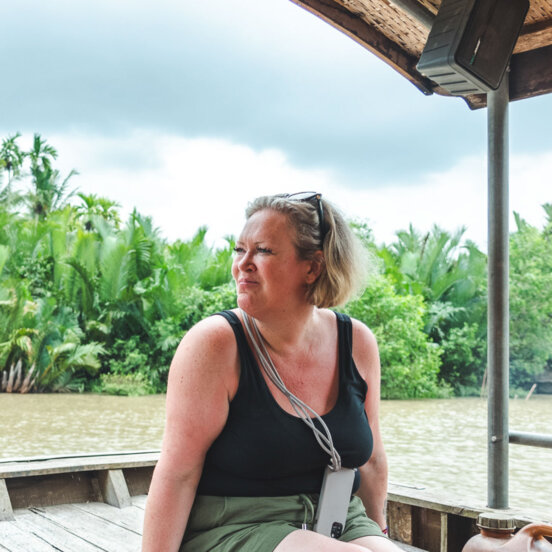Signs you’re going through a ‘third-life crisis’ – and why it’s a good thing

Recently, I watched this year’s Oscar-nominated film The Worst Person In The World, which portrays its female protagonist, Julie, making dramatic U-turns in her romantic and professional life as she enters her 30s. It struck a chord. Aged 30, I can’t relate to jokes about a ‘quarter-life crisis’. But I certainly feel attuned with this: a third-life crisis.
While the mayhem of your mid-20s is characterised by a general sense of lostness and bad decisions, the third-life crisis sufferer – aged in their 30s to 40s – typically has his or her life together, but has decided to up the stakes, demanding more. Be that ending a long-term relationship, rather than settling for marriage. Saying no to a promotion that would mean more money, but less happiness. Refusing to tick the expected milestones and finding your own way to live life.
Right now, I’m in the throes of that crisis. Sometimes, I want to want the same, simple milestones I thought I’d pass before my 30th birthday: marriage, 2.4 kids, a house, a successful career in the form of an editor role at a glossy magazine.

Our 30s offer us a valuable vantage point
But now, it’s almost like I’ve opened Pandora’s Box and I can’t close it again. The older I get, the less I know, and the more questions I have. What I do know for certain is if I want those things, it has to be on my own terms – and that might be a relationship that looks different to my happily-married parents; having children later or not at all; a postage-stamp-sized flat where I live alone, happily; a freelance career that offers little stability but maximum freedom.
And yes, I do panic that my life doesn’t look like the one I imagined, or like the peers I grew up with. But deep down, I’m calm. Because, in the midst of this questioning and reflecting – this crisis – I’m paving a life that’s my own.
I know I’m not the only one. Our 30s and beyond offer a valuable vantage point. We’ve already seen the first smatterings of divorces and broken engagements; burnout and redundancies. We no longer just put these shiny things on a pedestal, like we might have done in our 20s. We’re choosing happiness: and, unsurprisingly, according to a new study we can expect to be happiest between the age of 30 and 34. Whether it’s the effect of lockdown giving us a long pause to think, or simply a more specific type of crisis that happens around hitting 30, it’s a fascinating phenomenon. Less self-sabotage, more a controlled explosion.

You should feel proud of reaching this stage of questioning
Are you going through a third-life crisis? Perhaps, reading this piece, you’ve suspected as much, so I’ve compiled a helpful handbook of signs that you might be experiencing this phenomenon, too. Before you get on to reading them, a word of advice: don’t feel despairing if some of these signs apply; in fact, you should even feel proud of yourself for reaching this stage of questioning what you want from the rest of your life, at a time when you’re faced with making so many meaningful choices. All of which are as valuable as the next.
Having a third-life crisis – with the reflection, letting go and autonomy that it precipitates – might just be the opportunity you need to create the life you want. As Alain De Botton says, often a breakdown leads to a breakthrough.
You’ve started having therapy

Once stigmatised, therapy is now something we’ve come to embrace as part and parcel of living your best life. It’s even a badge of honour when you’re looking for a partner; research from popular dating app Hinge found that 91% of users would prefer to date someone who has had therapy.
If you’re looking to have therapy for the first time in your third-life period, it’s likely not so much a crisis point as a sign of progress: that you’ve acknowledged there may be things to unravel in order to help you move forward meaningfully at this juncture of your life. Good for you. Go get ‘em.
Read more: how to elevate your relationship with yourself
You’re considering a career change

It’s possible you won’t have had much of an opportunity to question your career over the past few years. You chose your path, you did the studying – and for the past decade or so you’ve put in the hard graft to progress, promotion to promotion, climbing the rungs of the career ladder.
Maybe you’ve now reached a point where you’re stable enough to take risks and look around. Or you’ve decided your work-life balance is all off and you’d actually benefit from being less, not more, ambitious. Perhaps things feel stale and you just need a change.
Whatever it is motivating your itchy feet, if you find yourself scrolling through LinkedIn, sliding into the DMs of recruiters; recruiting a career coach; negotiating with your current boss for a more flexible working pattern; or even researching a different career path entirely, Googling “How many years to become a psychoanalyst” on your lunch break, then it could be that you’re going through a third-life crisis, professionally.
You’re questioning your love life

Look, most of us were fed the same narrative when we were children: that one day we’d grow up, get married to someone of the opposite sex, have kids and live Happily Ever After. Sure, some of us might have questioned this early on, particularly if we’ve been through a process of coming out or a parental divorce, but the reality is that the way a lot of us date – regardless of our sexuality – has been inspired by a central, heteronormative, monogamous story.
It’s sometimes only when life gets real (the first of our peers begin marrying, having children); or when the myth is broken (we witness the first divorce in our friendship group), that we start to lose faith in the version of Happily Ever After we’ve been sold.
This could manifest in us questioning the relationship we’re in (perhaps realising that our decisions have, up until now, been made on autopilot, based on what we think we’re ‘supposed’ to want); exploring alternative relationship models, like open relationships or just being single and happy; interrogating whether we want children or not; or, if we are single, reframing it as a time of freedom, rather than a state of deficit.
Read more: lessons I learned on my first solo-travel trip
Your reading habits have changed

Reading, the cheapest form of travel, is a portal into another world. You can be stepping into a whole other career with John Grisham’s latest legal thriller; or demystifying your relationship with Amir Levine and Rachel S F Heller’s Attached.
We’ve all read books that have changed our lives – and if you find yourself reaching for, say, personal-development books when you’ve never read that genre before, or indulging in more and more tales of soul-searching solo travellers, it might be a sign you’re trying to inspire a change in your life.
You’ve bought a pet (or pot plants)

Once upon a time, you might have been expected to be married with a brood of children by the time you reached your 30s. Not anymore. The average age for a first-time mother in the UK is now 31, for fathers it’s 34, according to the latest data, with many choosing to delay parenthood until later (or opt out entirely).
Having said that, for some the nurturing instinct is nonetheless stronger as you reach the third-life mark: you’ve set up a comfortable home, you’re standing on your own feet and you want to give back to something – or someone.
Like having a baby, acquiring a pet can be a symbol of being stable enough to invest in a life. But if you’re ambivalent about having children, or you’re simply not in a place in your life where you want to go on that journey, you might look for alternatives.
Cue, buying a pet. A close friend – who does want kids – describes getting her puppy two years ago, following a break-up, as one of the most psychologically healthy moves she’s ever made.
“I’ve got a lot of love to give,” she tells me. “I love having someone there whose needs are uncomplicated and easy to meet. He reminds me daily that there’s something bigger than myself.” The cheaper (and much less high-risk) option is to buy pot plants – I used to have a melodramatic peace lily in my flat that wilted at the slightest sign of neglect, which, if anything, reminded me to keep myself (and it) hydrated.
Said peace lily recently passed, while I was away on a Flash Pack trip to Colombia. Which is why I’m sticking to plants for the foreseeable.
Francesca Specter is host of the podcast Alonement – about the positive side of spending time alone. To celebrate this community – and the joys of solo travel – Flash Pack is giving listeners of Alonement £100 off their next adventure with Flash Pack.
To claim, simply quote the code “ALONEMENT” when booking your next Flash Pack escape.










